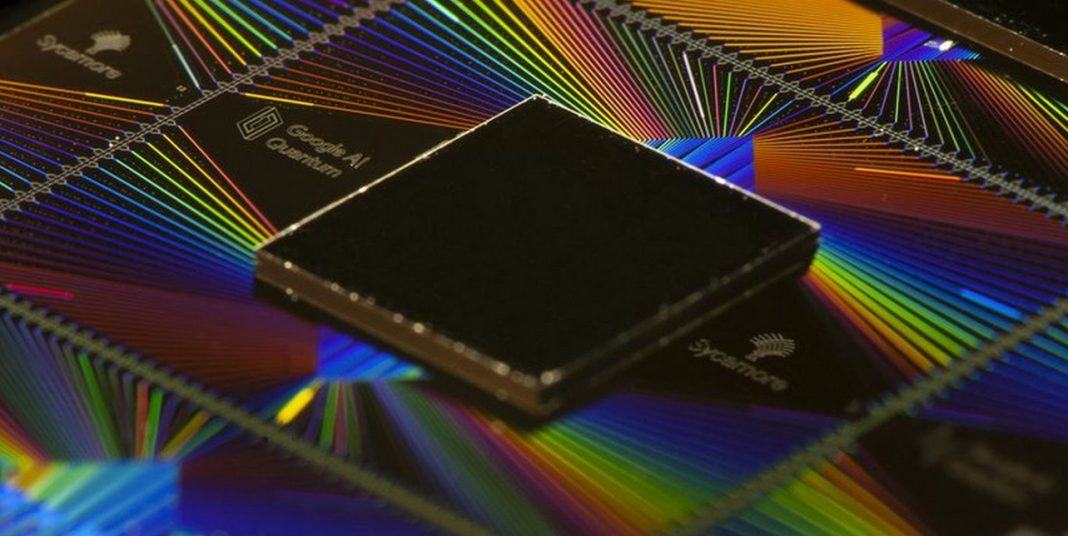
Google’s advanced Sycamore chip has taken the search engine giant to “quantum supremacy,” or at least that what the company announced on Wednesday. It has now achieved a breakthrough in quantum computing, by developing an experimental processor that takes just minutes to complete a calculation that would take the world’s best supercomputer thousands of years.
The feat could open the door someday to machines so blazingly fast that they could revolutionize such tasks as finding new medicines, developing vastly smarter artificial intelligence systems and, most ominously, cracking the encryption that protects some of the world’s most closely guarded secrets.
Such practical uses are still probably decades away, scientists said. But the latest findings, published in the scientific journal Nature, show that “quantum speedup is achievable in a real-world system and is not precluded by any hidden physical laws,” the researchers wrote.
Big tech companies including Microsoft, IBM, and Intel are avidly pursuing quantum computing, a new and somewhat bewildering technology for vastly sped-up information processing.
While conventional computing relies on bits or pieces of data that bear either a one or zero, quantum computing employs quantum bits, or qubits, that contain values of one and zero simultaneously.
How?
But quantum computing requires placing the fragile and volatile qubits in colder-than-outer-space-refrigerators to control them.
Google’s quantum processor looks like an upside-down garbage can, out of which comes a series of tubes used to conduct signals to a chip. The whole thing is stored in a cool chamber to protect the chip.
Google said that its quantum processor, called Sycamore, finished a calculation in 3 minutes, 20 seconds — and that it would take the world’s fastest supercomputer 10,000 years to do the same thing.
The calculation was a random sampling problem, similar to looking at the various combinations that could come from dice or a gambling machine. It has little practical value, other than to test how well the processor works.
“The more interesting milestone will be a useful application,” said Chris Monroe, a University of Maryland physicist who is also the founder of quantum startup IonQ.
Google’s findings, however, faced pushback from other industry researchers. A version of Google’s paper leaked online last month.
IBM Disagrees
IBM took issue with Google’s claim that it had achieved “quantum supremacy,” or the point when a quantum computer can perform a calculation that a traditional computer can’t complete within its lifetime.
IBM researchers said that its IBM-developed supercomputer, called Summit, could actually do the calculation in 2.5 days.
Google disputed IBM’s claims.
Whether or not Google achieved “quantum supremacy,” the research suggests the field is maturing.
“The quantum supremacy milestone allegedly achieved by Google is a pivotal step in the quest for practical quantum computers,” John Preskill, the Caltech professor who coined the term “quantum supremacy,” wrote in a column after the paper was leaked.
In essence, by harnessing the power of sub-atomic particles that can be in multiple at the same time, Google has been able to do something that would simply not otherwise be possible.
It means quantum computing research can enter a new stage, he wrote, though a significant effect on society “may still be decades away.”
One feared outcome — though experts said it is a long way off — is a computer powerful enough to break today’s best cryptography.
Quantum computers might also one day lead to the development of better artificial intelligence systems to guide financial portfolios, crop yields or transportation routes.
The promise of such applications has attracted interest from the U.S., China, and other governments. President Donald Trump last year signed a measure to spend more than $1.2 billion over five years for quantum research across the federal government.
Speed Matters
The team behind the work, headed by Frank Arute from Google AI, says: “This dramatic increase in speed compared to all known classical algorithms is an experimental realization of quantum supremacy for this specific computational task, heralding a much-anticipated computing paradigm.”
As CEO Sundar Pichai explains, one of the key achievements of Google’s work here has been eliminating errors. “We are able to achieve these enormous speeds only because of the quality of control we have over the qubits,” he said.
“Quantum computers are prone to errors, yet our experiment showed the ability to perform a computation with few enough errors at a large enough scale to outperform a classical computer.”
Google has been working on quantum computing – a field that has existed for around 30 years – for more than a decade. The recent advancements that have been made could have huge implications for future technology, but you probably shouldn’t expect to find a quantum chip in your net laptop or desktop computer.

